Incidentul a avut loc duminică în centrul orașului Aurillac, din sudul țării.
Sursa: EuroNews
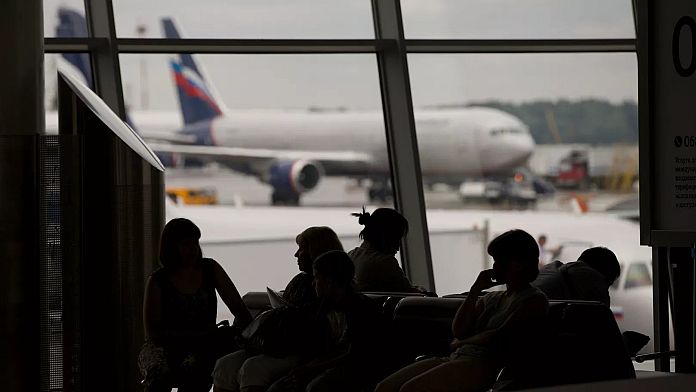
Drone ucrainene au perturbat din nou traficul aerian civil în Rusia în weekend, ceea ce a dus la demiterea ministrului Transporturilor, Roman Starovoit. Sâmbătă și duminică, 485 de lupte au fost anulate, potrivit agenției Federale de Aviație a Rusiei.
Sursa: EuroNews
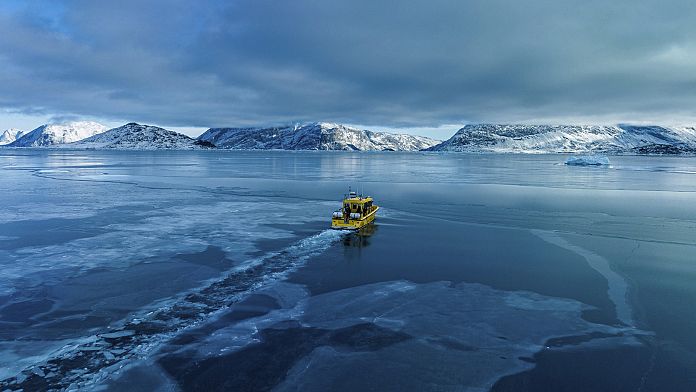
Conversația despre Groenlanda „nu poate fi niciodată despre anexare”, a declarat ministrul danez de externe, Lars Løkke Rasmussen.
Sursa: EuroNews
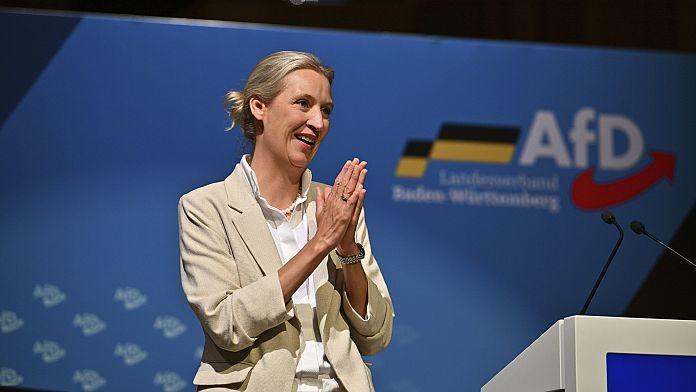
Criticii partidului de extremă dreapta din Germania spun că AfD este încă departe de a avea o influență reală, deoarece niciunul dintre celelalte partide din Bundestag nu este dispus să coopereze cu acesta.
Sursa: EuroNews
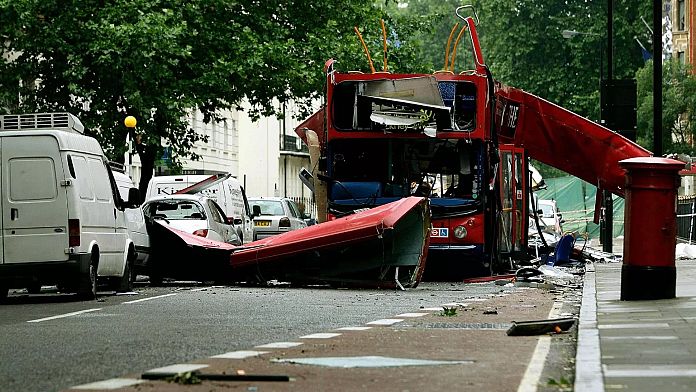
Cincizeci și două de persoane au fost ucise și sute rănite când patru atentatori sinucigași au atacat sistemul de transport al orașului pe 7 iulie 2005.
Sursa: EuroNews
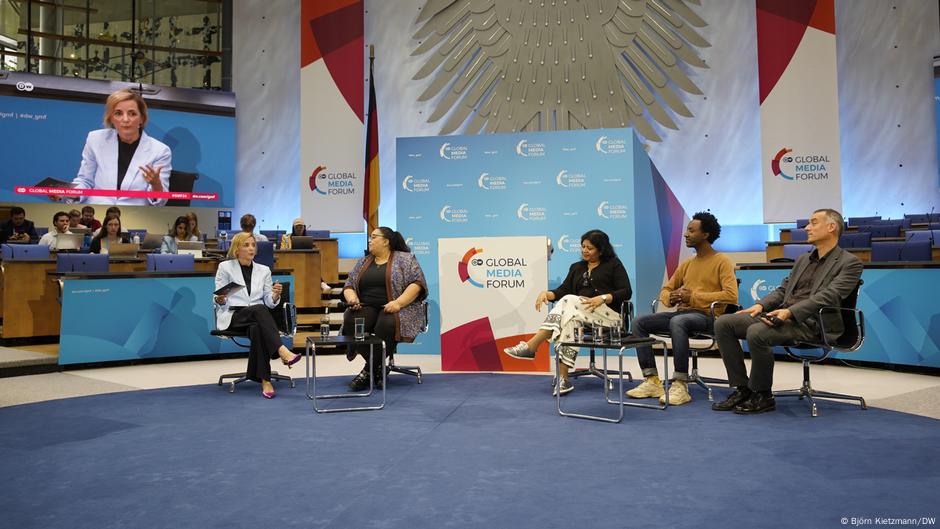
Prezența lui Steve Capus, președintele postului internațional de radio din SUA Radio Free Europe/Radio Liberty (RFE/RL), este un indiciu al presiunii la care sunt supuse în prezent mass-media libere, cum ar fi radioul de serviciu public, chiar și în Statele Unite. Administrația lui Donald Trump dorește să oprească finanțarea postului de radio cu sediul la Praga, care timp de decenii a fost un pilon cheie al parteneriatului transatlantic dintre Europa și SUA.
La fel ca DW, RFE/RL difuzează, de asemenea, reportaje necenzurate în țări în care peisajul mediatic este dominat de propagandă. „Trebuie să supraviețuim. Dacă nu reușim, este un cadou imens pentru Rusia și China”, a declarat Capus în perioada premergătoare conferinței.
Directorul general al DW, Peter Limbourg, va participa la o discuție despre atacul mass-media liberă. Imagine: Philipp Böll/DW
La Bonn, Capus va purta o discuție cu Michal Broniatowski, șeful postului de radio internațional polonez TVP World, directorul general al DW, Peter Limbourg, și Jonathan Munro, director global al BBC News.
„Instabilitatea politică este în creștere în multe părți ale lumii, iar consecințele pentru tot publicul nostru sunt enorme”, spune Munro. „În același timp, colegii din Statele Unite au fost forțați fie să închidă, fie să își restricționeze mass-media liberă. Aceasta este o evoluție îngrijorătoare, mai ales că dezinformarea și dezinformarea se răspândesc agresiv în întreaga lume.”
Premiul pentru Libertatea de Exprimare din acest an, un premiu acordat anual de DW pentru munca remarcabilă în promovarea libertății de exprimare și a drepturilor omului, îi este acordat lui Tamar Kintsurashvili din Georgia. Ea are preocupări similare. „Sub egida Uniunii Sovietice nu aveam niciun cuvânt de spus și eram complet dependenți de un sistem totalitar”, a declarat ea pentru DW. „Dar într-o țară democratică, toți cetățenii trebuie să țină guvernul sub control pentru a ne păstra libertatea. Mass-media are o responsabilitate deosebită de a asigura separarea puterilor în masă.”
În calitate de director executiv al Fundației pentru Dezvoltarea Media, o organizație non-guvernamentală, din capitala Georgiei, Tbilisi, Kintsurashvili le arată oamenilor cum să realizeze acest lucru. Ea îi învață pe jurnaliști cum să verifice faptele în mod fiabil și îi sensibilizează cu privire la discursul instigator la ură.
Multe dintre forumurile de discuții din programul GMF 2025 oferă instrumente practice și asistență pentru persoanele din mass-media. De exemplu, unul este intitulat: „Cum construiesc regimurile autoritare ziduri digitale – și cum să le depășească”.
În urma unui eveniment inițial pe tema inteligenței artificiale generative în jurnalism la forumul de anul trecut, întrebările legate de etica utilizării IA în jurnalism vor fi centrale pentru GMF 2025. În ce măsură este acceptabil ca jurnaliștii să utilizeze IA în munca lor?
Pentru a viziona acest videoclip, vă rugăm să activați JavaScript și să luați în considerare actualizarea la un browser web care acceptă videoclipuri HTML5
O modalitate prin care Europa poate răspunde diviziunii și populismului este să se extindă și să admită mai mulți membri. Unul dintre cei mai recenți candidați la aderare, Ucraina, este prinsă în prezent în apărarea sa împotriva războiului de agresiune al Rusiei. Prin urmare, există un mare interes pentru discursul principal al comisarului UE pentru extindere, Marta Cos. Își va ține comunitatea europeană cuvântul dat țării asediate?
Anul acesta, GMF îl va primi și pe ministrul sirian al informațiilor, Hamza al-Mustafa. Viitorul țării multietnice este incert acum, după ce conducătorul său de lungă durată, Bashar Assad, susținut de Vladimir Putin, a fost înlăturat. Al-Mustafa va vorbi despre rolul mass-media în reconstrucția Siriei.
Printre vorbitorii de la GMF din acest an se numără noul ministru sirian al informațiilor, Hamza Al-Mustafa.Imagine: privat
Cum poate mass-media să ajute oamenii să depășească barierele, când atât de mulți, în special în Orientul Mijlociu, suferă din cauza războaielor care nu fac decât să adâncească diviziunile? Un film documentar, coprodus de DW, despre cea mai mare crimă de război din Europa de la al Doilea Război Mondial încoace, încearcă să ofere un răspuns. „Caseta de la Srebrenica — de la Tata pentru Alisa”, regizat de Chiara Sambuchi, va fi proiectat de DW în premieră în cadrul GMF.
Protagonista, Alisa, avea nouă ani când tatăl ei a fost ucis de trupele sârbe în „zona sigură” a ONU din Srebrenica, acum 30 de ani. El a fost unul dintre cei 8.000 de bărbați și băieți care au murit în masacrul de la Srebrenica, care a avut loc pe parcursul a mai multor zile.
Astăzi, Alisa locuiește cu mama și fiica ei în orașul Sankt Petersburg, în statul american Florida. La începutul războiului din Bosnia și Herțegovina, care a durat între 1992 și 1995, părinții ei au dus-o în siguranță peste graniță, la bunicii materni din Serbia. Apoi s-au întors la Srebrenica.
În timpul blocadei Srebrenica, care a durat mai bine de trei ani, tatăl Alisei, un pasionat de filme și cineast amator, a filmat viața lor de zi cu zi sub asediu în micul oraș. În aceste înregistrări, vorbește adesea direct cu fiica sa. A reușit să-i procure o casetă VHS înainte ca Srebrenica să fie invadată de trupele sârbe conduse de generalul sârb bosniac Ratko Mladić.
Alisa își îndureră tatăl. Piatra sa funerară se află la memorialul din Srebrenica.Imagine: DOCDAYS Productions
Pentru Alisa, fiica unei mame sârbe și a unui tată bosniac musulman, care a fost ucisă de sârbi, depășirea barierelor este o chestiune de importanță existențială. „Alisa a decis, pentru ea, să nu ia [parte]”, a declarat pentru DW regizoarea, Chiara Sambuchi. Cel mai important lucru pentru Alisa a fost să clarifice faptul că se opun „acestei teribile uri religioase, urii etnic-religioase și a ceea ce implică ea”.
Acest articol a fost tradus din germană.
Sursa: DW
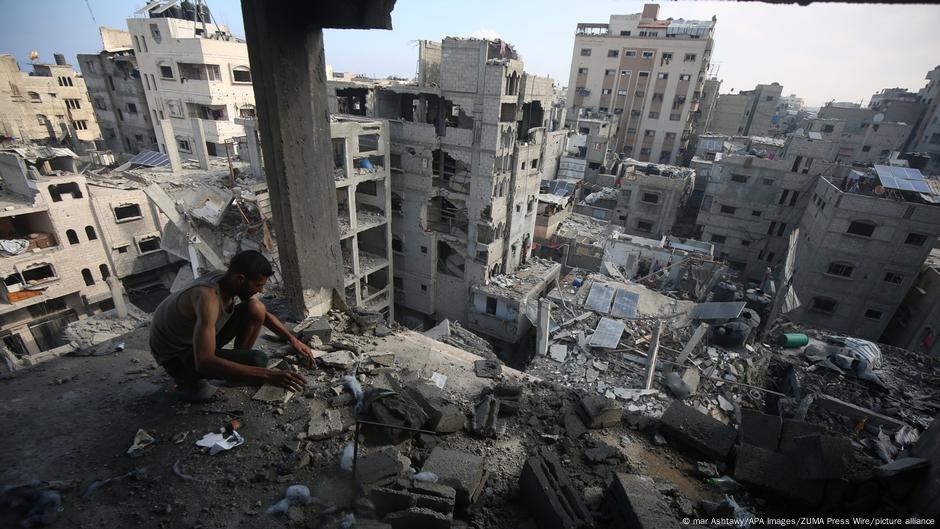
Here are the latest updates from around Gaza, Israel and the wider Middle East on Monday, July 7.
Skip next section US envoy encouraged by Lebanon’s take on Hezbollah disarmament07/07/2025July 7, 2025
US Special Envoy Thomas Barrack on Monday said he was “unbelievably satisfied” with Lebanon’s response to a US plan for disarming the Iran-backed Lebanese militia Hezbollah.
The militant Islamist group recently vowed that it would not give up its weapons, yet Beirut gave a detailed seven-page report to the US in response to Washington’s June 19 proposal for disarming the group.
After meeting with Lebanon’s President Joseph Aoun, Barrack told reporters: “What the government gave us was something spectacular in a very short period of time. I’m unbelievably satisfied with the response.”
In a warning to the impoverished Middle Eastern country, Barrack had previously said Lebanon risks being “left behind” by developments in the region.
US Envoy Barrack also called for Hezbollah to become a purely political player in the region, saying the group “needs to see that there is a future” for it in the Middle East.
Hezbollah joined attacks on Israel shortly after Hamas launched its October 7, 2023, attack on Israeli civilians, with Israel regularly returning fire into Lebanon.
https://p.dw.com/p/4x4QxSkip next section Israel launches fresh strikes on Houthis07/07/2025July 7, 2025
Jon Shelton
Israel on Monday launched attacks at Houthi targets in Yemen hours after a Greek-owned, Liberian-flagged cargo ship — the Magic Seas — was attacked near the Yemeni port of Hodeidah late Sunday.
Israeli air forces on Monday struck targets in ports of Hodeidah, Ras Isa and Salif, as well as a power plant at Ras Qantib.
“These ports are used by the Houthi terrorist regime to transfer weapons from the Iranian regime, which are employed to carry out terrorist operations against the state of Israel and its allies,” read an Israeli military statement.
Israel also struck the Galaxy Leader, a vessel seized by the Houthis last November. The group had been using it to track international maritime traffic and plan further attacks.
Yemen’s Houthi rebels, who are thought to be behind the attack on the Magic Seas, fired two missiles at Israel in response to the strikes. Israeli military efforts to intercept the missiles appear to have failed, though no injuries have been reported.
The attack on the Magic Seas was reportedly carried out with bomb-laden drone boats, signaling a potential escalation of Iranian involvement. The Islamic Republic is a backer of the rebel Houthis, who began attacking Israel in response to its military campaign against Hamas in retribution for Hamas’ October 7, 2023, attacks on Israel.
Both the US and Israel have attacked Houthi strongholds in an effort to ensure freedom of movement for nearly
As Gaza ceasefire talks loom and the world waits to see how Iran will react to the recent US bombing of its nuclear program, Israel issued a warning to both the Houthis and leaders in Tehran.
“What’s true for Iran is true for Yemen,” said Defense Minister Israel Katz: “Anyone who raises a hand against Israel will have it cut off. The Houthis will continue to pay a heavy price for their actions.”
https://p.dw.com/p/4x4AGSkip next section Israel to issue conscription notice to 54,000 ultra-Orthodox Jewish men07/07/2025July 7, 2025
The Israeli army on Sunday said it will begin sending conscription notices to 54,000 ultra-Orthodox Jewish men through July, who were exempt from military service until now.
“The army will begin this week issuing summons to complete the enlistment process for ultra-Orthodox men whose status as yeshiva (religious seminary) students is no longer valid following the expiration of the previous legal arrangement,” said a military statement.
“The military will continue efforts to expand enlistment among the ultra-Orthodox public, while working to ensure the best possible conditions that respect their unique way of life,” it added.
This move is highly controversial and could spell trouble for Netanyahu’s coalition government, which includes representatives from the ultra-Orthodox community as well.
An arrangement dating back to 1948 exempts the ultra-Orthodox, or Haredi (God-fearing) Jews who are dedicated to religious studies, from military service.
Around 66,000 men currently fall under the exemption.
Israel’s Supreme Court has often challenged this status since the 2000s. Since June 2024, the ruling government has been under pressure from the judicial system to start drafting Haredi men.
To view this video please enable JavaScript, and consider upgrading to a web browser that supports HTML5 video
https://p.dw.com/p/4x3g9Skip next section Netanyahu to meet Trump at White House07/07/2025July 7, 2025
Israeli Prime Minister Benjamin Netanyahu left on Monday to meet with US President Donald Trump at the White House in Washington DC.
“This is my third visit with (US President Donald Trump) since he was elected over six months ago,” Netanyahu told reporters at Ben Gurion Airport near Tel Aviv before his departure.
Urmărește cele mai importante știri
Netanyahu also plans to meet US government officials as well as other Republican and Democratic leaders.
To view this video please enable JavaScript, and consider upgrading to a web browser that supports HTML5 video
On Sunday, Trump had said that a ceasefire and hostage release deal could possibly be reached this week.
“We are working to achieve the much discussed deal, on the conditions that we have agreed to,” Netanyahu said, referring to a US proposal. Hamas has requested some amendments but agreed to the proposal in principle.
Experts and analysts believe that Israel and Hamas will be able to overcome their differences to reach a deal.
To view this video please enable JavaScript, and consider upgrading to a web browser that supports HTML5 video
https://p.dw.com/p/4x3foSkip next section BRICS leaders express ‘grave concern’ about Gaza situation07/07/2025July 7, 2025
Leaders of the BRICS group of nations expressed “grave concern” about the situation in Gaza after their meeting on Monday.
“We reiterate our grave concern about the situation in the Occupied Palestinian Territory, with the resumption of continuous Israeli attacks against Gaza and obstruction of the entry of humanitarian aid into the territory,” they said.
The group called for adherence to international law while also encouraging an immediate ceasefire, withdrawal of Israeli troops from Gaza and the release of all detainees and hostages.
They also condemned the Israeli and US military strikes on Iran.
https://p.dw.com/p/4x3QcSkip next section First round of Israel-Hamas ceasefire talks ends indecisively: sources07/07/2025July 7, 2025
The first round of ceasefire talks between Israel and Hamas in Doha, Qatar, ended inconclusively, Palestinian sources close to the matter said on Monday.
“After the first session of indirect negotiations in Doha, the Israeli delegation is not sufficiently authorized … to reach an agreement with Hamas, as it has no real powers,” the sources told Reuters news agency.
The BBC reported that the talks took place in two different buildings, and lasted for about three and a half hours.
The two sides communicated through Qatari and Egyptian mediators, but to no avail. Talks are expected to resume again on Monday.
https://p.dw.com/p/4x3NPSkip next section Welcome to our coverage07/07/2025July 7, 2025
Tanika Godbole with AP, AFP, dpa, Reuters | Elizabeth Schumacher Editor
Hello and welcome to DW’s coverage of developments in the Middle East on Monday, July 7, 2025.
Talks between Israel and Hamas in Doha, Qatar, on Sunday about a possible ceasefire ended inconclusively, Palestinian sources close to the matter said.
Israeli Prime Minister Benjamin Netanyahu is flying to Washington for talks with US President Donald Trump, who suggested on Friday that there “could be a Gaza deal” next week.
https://p.dw.com/p/4x3M2Tanika Godbole Multimedia Journalist based in New DelhiJon Shelton Writer, translator and editor with DW’s online news team.Send us your feedback
Sursa: DW
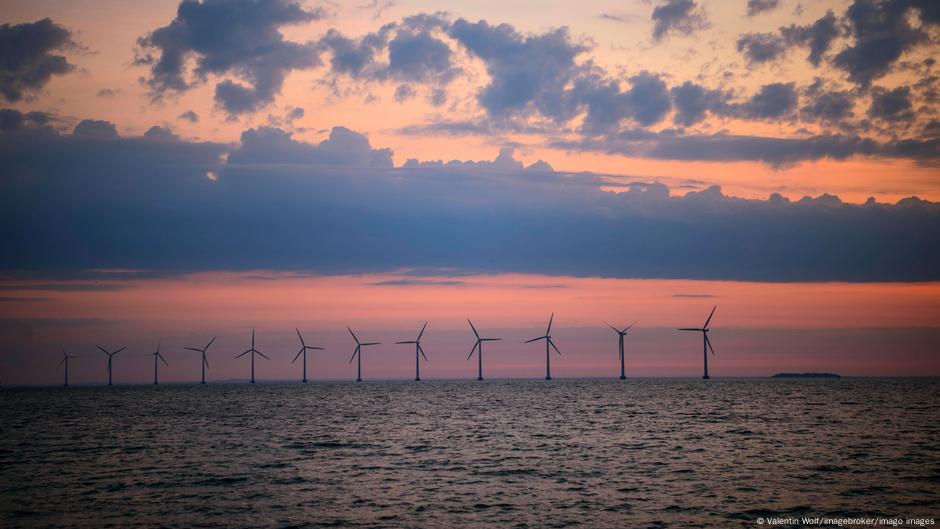
It was here that the Nordic nation chose to launch its six-month stint heading up the EU Council, the body representing the bloc’s 27 national governments.
And a word that’s fallen out of vogue in European policy-making circles made the cut in Denmark’s stated priorities: “Green.”
“There’s a lot at stake,” Climate and Energy Minister Lars Aagaard told DW as Denmark’s EU presidency kicked off.
To view this video please enable JavaScript, and consider upgrading to a web browser that supports HTML5 video
Gone are the days when climate policies dominated the European Union’s agenda; when school climate strikers demonstrating in towns and cities across the bloc prompted policymakers to come up with the so-called Green Deal, dubbed Europe’s “man on the moon moment” by the EU Commission back in 2018.
Since then, the realities of radically shifting geopolitics have swung like a wrecking ball onto Europe’s political consciousness — from Russia’s full-scale invasion of Ukraine and the resulting energy and inflation crisis, to US President Donald Trump’s tariffs and mounting existential fears in European industries from car-making to chemicals.
Green parties lost out in most countries in last year’s European elections after what many analysts dubbed a backlash against green policies.
With US tariffs already biting, the EU is trying to cut red tape to help European firms compete internationallyImage: Michael Probst/AP/picture alliance
The EU’s big promises to slash emissions have already been enshrined in law, allowing the bloc to keep up its claim of climate leadership on the global stage — especially with Washington pulling out of the Paris climate deal.
But bit-by-bit, lower-profile elements of Europe’s green legislation are coming under fire in debates on how to ease burdens on businesses to help the EU compete with the likes of China and the US.
“We support a climate policy driven by innovation, investment, and responsibility — not by radical bans or ideology,” leaders of the EU’s biggest political grouping, the center-right European People’s Party, said in a statement late last month. “We are ambitious, yet pragmatic,” they wrote.
While those leaders praised a series of red-tape-cutting plans laid out by the EU’s executive, climate campaigners have rejected the moves. Recently, Brussels also sparked their ire by shelving draft anti-greenwashing rules.
Denmark’s prime minister Mette Frederiksen says security and rearming Europe is her country’s top priority as its EU presidency begins.Image: Mads Claus Rasmussen/Ritzau Scanpix/IMAGO
To keep climate action moving, Denmark is finding new ways to frame the argument: By casting the green transition as a key ingredient in Europe’s bid to boost its military independence.
“Climate change is about defense. Europe’s strategic autonomy is threatened, and it’s threatened partly because we are so extremely dependent on the import of fossil fuels,” Energy Minister Aagaard said — referring to the bloc’s past dependence on Russian oil and gas and its new plans to gradually ban their sale.
“Bringing Europe into a position where we can produce more of the energy we need, where we get more energy efficient, where we create a strong economics based on decarbonized energy, for me that’s also the response,” he added.
Denmark’s center-left-led government has given security top billing in its EU presidency, following on from Poland which held the rotating role for the first half of 2025. The Danish defense ministry has also gone further than most EU states in its national bid to beef up military independence, by extending conscription to women.
Denmark is extending military conscription to some women as it steps up its bid to rearm Image: Henning Bagger/Ritzau Scanpix/picture alliance
Still, researchers acknowledge Europe’s race to rearm brings its own challenges for climate policymaking.
Emissions linked to military work tend to be top secret, and researcher Jens Mortensen says the search for more critical materials like rare earth metals may “delay or slow down the green transition.”
“In the short term defense spending is prioritized, and there will be a concern about what it does to our emissions,” Mortensen, a political scientist who lectures on global environmental governance at Copenhagen University, told DW.
“But right now we probably have to. That’s the feeling in the North: We have to. We feel very exposed.”
The EU unveiled its latest emissions reduction plan as large swathes of Europe’s south sweltered through heatavesImage: Remo Casilli/REUTERS
Not all EU governments share the Danes’ assessment that going green will equip the EU to better defend itself and compete internationally.
The political challenge that lies ahead became evident last week when the European Commission proposed a new legally binding stepping stone on the EU’s path to achieving net-zero greenhouse gas emissions by 2050.
Citește mai multe știri pe top10stiri.ro
Under the latest proposals, the EU must cut greenhouse emissions 90% by 2040 compared to 1990 levels.
“As European citizens increasingly feel the impact of climate change, they expect Europe to act,” Commission chief Ursula von der Leyen said recently.
However, Italy, Czechia, and Poland have been critical of the bill, which still requires approval from EU states and lawmakers.
“Our country is not yet ready to implement such ambitious plans,” Poland’s environment minister, Paulina Hennig-Kloska, told news channel Polsat last week. “The EU’s reduction target must be realistic, and the contributions of individual countries toward achieving it must be varied,” she said.
Climate campaigners, meanwhile, were disappointed that the draft legislation allows states to include carbon credits gained through investments in environment projects outside Europe in their climate accounting.
“Most international offsets aren’t worth the paper they’re written on and have done nothing to cut emissions. They’re also a waste of taxpayers’ money,” Michael Sicauld-Clyet of the World Wildlife Fund said last week.
Researcher Jens Mortensen saw the compromise as a means to an end. “We have to give in on certain issues,” he said. “It’s controversial, but it was necessary to convince skeptics.”
Denmark’s presidency gives it more power over the EU’s policymaking agenda.Image: Jens Noegaard Larsen picture alliance / dpa
Convincing skeptics will be Copenhagen’s daily business through the rest of 2025. Asked whether he expected to get Czechia and others on board with emissions-cutting targets, Minister Lars Aagaard said: “Time will show.”
“I know that there are short-term concerns in a number of European countries that climate change politics can be a challenge to economic development,” he added.
“But I also think that it’s important for all of us to remember that meeting our climate targets is part of what should make Europe competitive in the longer run.”
Lecturer Jens Mortensen says Denmark can only hope to keep countries talking about climate policies, rather than turning political tides, due to the limits of its role.
“It’s really about trying to reframe current challenges and the mess we’re in to say: ‘Don’t forget the green transition.’ We are aware it’s lost its top priority.”
Edited by: Rob Mudge
Send us your feedback
Sursa: DW
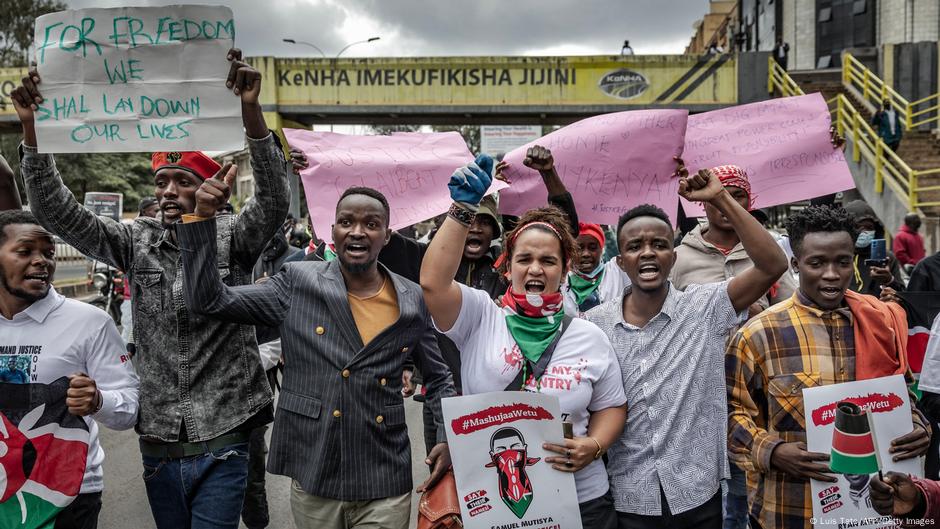
” alt=”Protesters chant slogans calling for the resignation of senior police officers in Nairobi, Kenya. “/>In 2025, Kenyans have taken to the streets to protest police brutality and abductionsImage: Luis Tato/AFP/Getty Images
July 7 became the date Kenyan protesters in the 1990s used to steer the country clear of autocracy and toward political accountability. In 2025, that spirit may be more relevant than ever.
“The striking similarity between the Gen Z protests of 2024-25 and the Saba Saba protests of the ’90s is that both were centered on a clamor for better leadership,” analyst Mutuma Kithinji tells DW.
“It was the day people came out in open defiance of a brutal dictatorship,” says human rights activist Wanjira Wanjiru. “It was a day we reclaimed our voice.”
By 1990, Kenya had known just two leaders, despite gaining independence on December 12, 1963. Daniel arap Moi had led Kenya for 12 years by exploiting intense ethnic-based rivalry, and Kenya effectively became a one-party state increasingly known for kleptocracy, corruption and state abuse.
Daniel Arap Moi’s leadership was tainted by kleptocracy and corruptionImage: Getty Images/AFP/A. Joe
But extensive protests, the end of the Cold War, and a stagnating economy tempered Moi’s grip on power. When two cabinet ministers, Kenneth Matiba and Charles Rubia, were detained without trial, the first Saba Saba protests erupted in July 1990. Twenty people were arrested and 1,056 people were charged, although no law enforcement officials faced prosecution.
Protesters wanted a multi-party democracy, and despite state repression, Moi caved. While the resulting 1992 and 1997 elections were marred by violence and vote rigging, Moi’s seemingly untouchable power was checked.
Nairobian Eliza Njoroge says the Saba Saba protests remain influential to ordinary Kenyans.
“They were disruptive, but made people very confident. They definitely changed Kenya, and the people realized they can speak up and that they have the power,” she told DW.
For analyst Kithinji, many of the problems from 1990 are still prevalent today.
“The Gen Zs feel the leadership does not address their issues: accountability, economic injustice, corruption, disappearance of people, extrajudicial killings, among others,” he told DW.
A view widely held, including by Kithinji, is that while the Saba Saba protests of 1990 had definitive political leadership figures such as Rubia and Mathiba, the Gen Z-led demonstrations today are a grassroots movement without defined leaders or ethnic affiliations.
The Kenya Finance Bill protests of 2024 exploded in June after the government approved unpopular legislation that would have significantly increased taxation of ordinary Kenyans. President William Ruto was forced to shelve the bill.
“We are doing the same things we did in 1990. The causes are the same, except that this time it’s in a technologically different environment,” says David Kyule of the University of Nairobi. A key factor, he says, is that young Kenyans today are better educated than the protesters in the 1990s, partly due to education rights enshrined in Kenya’s 2010 constitution.
“They have come of age in a time of widespread suffering and unmet expectations,” Kyule explains.
But while the protestors have changed, their core grievances have not. And neither, arguably, has the attitude of the politicians in power, and how they have used force to respond.
Police in Kenya have cracked down on protesters, leading to scores of deathsImage: Brian Inganga/AP/picture alliance
The mid-2024 demonstrations saw more than 50 people killed when police and security forces confronted protesters.
“We have the current President (Ruto), who was there in those days, and many know him as a student of Moi,” Kithinji told DW. “The government reponded with force in the 1990s and today.”
But according to Wanjira Wanjiru, another key concern is the unknown number of protesters who have been forcibly disappeared.
“The abductions and extrajudicial killings happening today are more rampant. The blatant disregard for human rights is shocking. So is the disregard for rule of law,” she told DW.
Kenya, and particularly Nairobi, has already seen large, youth-led protests, initially to commemorate the deadly demonstrations of 2024. The unexplained death of blogger Albert Ojwang in police custody sparked more anti-police brutality demonstrations.
In response, Kenya’s Interior Minister Kipchumba Murkomen claimed the demonstrations were an attempted coup, and issued a “shoot to kill” directive for officers if they were attacked.
The Kenyan government has also tried to cast protestors as a destabilizing force, mirroríng the approach of Moi’s government in 1990.
“There’s no credible evidence suggesting that this is the case in either era,” says Kithinji. “Labeling the protestors as destabilizing is more about political control.”
David Kyule told DW that police responses have appeared to worsen the situation, with the ensuing chaos suggesting violence and destruction, rather than the initial, peaceful demonstrations.
As for alleged attempts to intimidate protesters through abductions, Wanjiru says: “People have completely lost their fear. In fact, any attempt to bring back fear to the people kind of inspires more resistance and has the opposite effect,” she told DW.
To view this video please enable JavaScript, and consider upgrading to a web browser that supports HTML5 video
With the Saba Saba protests seemingly inevitable, Parliament has introduced a bill to restrict protests within 100 meters of key government institutions, such as the parliament, state house and courts.
“These are all attempts at cracking down [on] the people’s voice and to evade accountability. Instead of addressing the demands of the protesters, they’re looking to crack down on democracy further,” Wanjira told DW.
Others remain unconvinced that there will be justice for the scores of people already killed.
A young Kenyan woman, who asked to remain anonymous, told DW: “Albert Ojwang’s case is still in court. And Rex Masai, the first person we lost during last year’s protest, his case is still in court. When you go to the streets to seek justice for those people, we lose more people. Will they get justice at any time?”
Steve Marsha, a trainee journalist, said it remained important for Kenyans to stand up for their constitutional rights, and pointed to Ruto’s government trying to ban coverage of the protests.
“We are on the edge from where the country will probably plunge to a place that we will not be able to get ourselves out,” he told DW.
Edited by: Sarah Hucal
To view this video please enable JavaScript, and consider upgrading to a web browser that supports HTML5 video
This article was updated on July 3, 2025, to reflect the correct date of Kenya’s independence
Sursa: DW